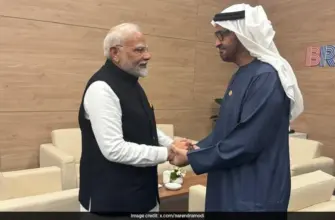After years of strained relations and diplomatic deadlock, American and Iranian officials engaged in a preliminary round of direct discussions Saturday in Muscat, Oman. This significant development, confirmed by both the White House and Iranian state television, represents a potential turning point following escalating tensions surrounding Iran’s nuclear program.
The Meeting: A First Face-to-Face Exchange
U.S. Special Envoy Steven Witkoff, accompanied by U.S. Ambassador to Oman Ana Escrogima, met with Iranian Foreign Minister Abbas Araghchi in a session lasting just over two hours. According to the White House, President Trump personally directed Witkoff to pursue diplomatic solutions if possible.
“The United States deeply thanks the Sultanate of Oman for its support of this initiative,” a statement from the White House indicated, describing the talks as “very positive and constructive.”
Military Pressure & Iran’s Response
Analysts suggest that recent U.S. military deployments in the region have played a crucial role in bringing Iran to the negotiating table.
- Rebecca Grant, a senior fellow at the Lexington Institute, noted the presence of powerful assets including:
- Four to six B-2 stealth bombers stationed in Diego Garcia
- Two aircraft carriers deployed nearby
“Iran either has to talk or get their nuclear facilities bombed,” Grant stated.
The Nuclear Program & International Concerns
Since the U.S. withdrew from the 2015 nuclear agreement in 2018, Iran has steadily expanded its enrichment capabilities. A recent report by the International Atomic Energy Agency (IAEA) revealed:
- Iran is currently enriching uranium to 60% purity – just below weapons-grade.
- They have stockpiled over 18,000 pounds of enriched uranium.
While U.S. intelligence agencies do not believe Iran has actively begun construction of a nuclear weapon, they acknowledge the country is approaching that capability.
General Jack Keane, a Fox News military analyst, emphasized the perception within Iranian leadership that President Trump is prepared to utilize force if necessary.
“They’ve come to the conclusion that the president is dead serious about supporting an Israeli-led, U.S.-supported strike on Iran to take down their nuclear enterprise.”
Potential Deal & Future Steps
Former Secretary of State Mike Pompeo insists any future agreement must include a complete dismantling of Iran’s nuclear weapons program.
“We have to fully, verifiably eliminate their nuclear weapons program for there to be any agreement. All we ask is that they behave like a normal nation.”
Experts believe a viable deal would require:
- Robust inspection protocols
- Surrender of some enriched uranium
- Limitations on ballistic missile development
The two countries are scheduled to resume discussions on April 19, also in Oman. Despite Iran’s stated reluctance for direct negotiations and accusations that the U.S. has broken past commitments, a pathway toward diplomacy appears to be tentatively opening.
Iranian Foreign Ministry spokesperson Esmail Baghaei warned of negative consequences stemming from threats.
“Violence breeds violence, peace begets peace.”


